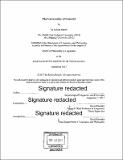The universality of concord
Author(s)
Bayırlı, İsa Kerem
DownloadFull printable version (9.148Mb)
Other Contributors
Massachusetts Institute of Technology. Department of Linguistics and Philosophy.
Advisor
David Pesetsky.
Terms of use
Metadata
Show full item recordAbstract
Abstract In this dissertation, we develop and defend a universal theory of concord (i.e. feature sharing between a head noun and the modifying adjectives). When adjectives in a language show concord with the noun they modify, concord morphology usually involves the full set of features of that noun (e.g. gender, number and case). However, there are also languages in which concord targets only a subset of morphosyntactic features of the head noun. We first observe that feature combinations that enter into concord in such languages are not random. We then show that this observation can be explained with a theory of concord that has the following properties: (i) concord is obligatory whenever phasal domains are inactive (the obligatoriness claim) and (ii) languages that lack concord have a phasal Noun Phrase (the phase claim). We provide evidence supporting these claims. The obligatoriness claim leads to two predications: (1) idiosyncratic gender languages are gender concord languages and (2) languages with pluralia tantum nouns are plural concord languages. We show that these predictions are empirically supported. The phase claim implies that a language lacks overt manifestation of concord only if it has a phasal NP. We show that, due to the phasal status of NP, non-concord languages exhibit the following properties: (1) AP movement out of NP is not possible, (2) the Num head need not be obligatory in the extended projection of a noun (leading to number neutrality) and (3) nominal inflectional elements can be shared between coordinated nouns. We provide evidence supporting these claims.
Description
Thesis: Ph. D. in Linguistics, Massachusetts Institute of Technology, Department of Linguistics and Philosophy, 2017. Cataloged from PDF version of thesis. Includes bibliographical references (pages 232-243).
Date issued
2017Department
Massachusetts Institute of Technology. Department of Linguistics and PhilosophyPublisher
Massachusetts Institute of Technology
Keywords
Linguistics and Philosophy.